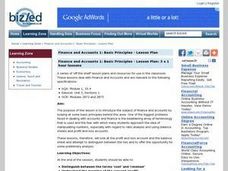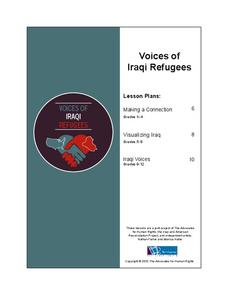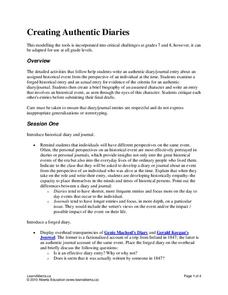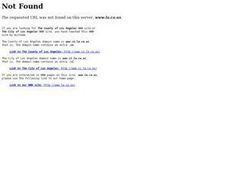Federal Reserve Bank
Cash the Check and Track the Dough
From checking and savings accounts to learning the importance of maintaining records and balancing a bank account, prepare your students to become financially independent and savvy adults, and explore all the intricacies of owning a bank...
Visa
Make It Happen: Saving for a Rainy Day
Every little penny counts, especially when it comes to saving for emergencies or long-term goals. Pupils evaluate different saving and investment strategies, such as a CD or money market account, through worksheets and by researching...
Curated OER
Banking Basics
Students examine ways to make money grow through banking basics. For this banking basics lesson, kids identify the types of bank accounts and explore the different types of accounts. Students work in pairs to create pamphlets about...
Curated OER
Using High Stakes Testing to Make Students and Schools Accountable for Learning
Students conduct an informal survey about their views on high stakes testing and use basic computation skills to evaluate results as a group. They participate in activities related to high stakes testing and "No Child Left Behind"...
University of Southern California
Persecution of the German-Jews: The Early Years - 1933-1939
Young historians learn about the dehumanization process of stripping German Jews of basic, fundamental rights prior to the genocide of European Jews in the 1940s. Learners watch video clips of survivors who recount such events as the...
Federal Reserve Bank
Banking on Debit Cards
What are the advantages and disadvantages of using a credit card versus a debit card? What are the costs of using a debit card irresponsibly? Here you'll find a lesson on key concepts that every learner should know regarding personal...
Federal Reserve Bank
Lesson 2: In the Aftermath
Don't wait for a crisis to get your finances together. An economics lesson demonstrates the importance of understanding crucial documents, banking basics, and financial tools with the focus on Hurricane Katrina in 2005 and its effects.
Curated OER
Finance and Accounts 1: Basic Principles
Students distinguish between the terms 'cost' and 'revenue' and examine the concept of 'profit'. They analyze the difference between a profit and loss account and a balance sheet.
Curated OER
Interpreting Company Accounts
High schoolers look at the two aspects of interpreting company accounts. They can be closely related to each other. Depreciation is investigated and is interpreted according to the inquiry made. The affect of how accounts are presented...
Curated OER
Organizing A Corporation And Paying A Dividend
Students engage in a instructional activity that is concerned with the establishment of a corporation. They apply accounting principles to different situations in order to make payments on a dividend. Students also investigate the basic...
Federal Reserve Bank
Money and Inflation: A Functional Relationship
What is the difference between money and bartering, and how is money valued when considering inflation? Delve into the correlation between these fundamental components of economics with this detailed resource, which consists of reading...
Annenberg Foundation
America's History in the Making: Using Digital Technologies
How can digital technology of today link us to the events of the past? Scholars use technology to uncover the vast number of historical resources available in lesson 12 of a 22-part America's History in the Making series. Using databases...
Curated OER
Hunger at Home
Learners identify basic nutritional needs. They also glean recommendations from the food pyramid, recommended dietary guidelines, importance of exercise throughout the life cycle, and how proper nutrition helps the body to resist...
Sierra College
"Deals on Wheels!" Car Loan Project
Help your class members learn how to use their income wisely with a comprehensive lesson plan on calculating monthly car payments. Using basic math skills and online calculators, your learners will determine the total amount to be...
Stanford University
Historical Thinking Chart
Narrow down your questions about author perspective, historical context, and veracity of claims in a document with the help of a historical reading chart. Learners track the basics of the document along with advanced evaluation skills...
National Endowment for the Humanities
Revolution '67, Lesson 2: What Happened in July 1967? How Do We Know?
Even in a world in which dozens of participants and curious onlookers record every controversial event, the basic facts of what happened are often in dispute. Revolution '67, Lesson 2 explores 1967 Newark, New Jersey using an examination...
Advocates for Human Rights
Voices of Iraqi Refugees
The stated goal of this resource is to provide learners with basic facts about and build empathy for Iraqi refugees. To do so elementary classes develop a plan for how to welcome refugees to their classroom. Middle schoolers read...
Alberta Learning
Creating Authentic Diaries
Napoleon Bonaparte once said, "What is history but a fable agreed upon?" A series of lessons encourages learners to look beyond the basic fable agreed upon related to events in history and consider multiple accounts of the event. The...
PricewaterhouseCoopers
Saving and Investing: Building Wealth for Financially-Secure Futures
While spending is fun, saving for a retirement is the future. Young adults learn about the importance of saving and different opportunities to do so during their adulthood.
PricewaterhouseCoopers
Planning and Money Management: Financial Plan
More planning goes into a budget than a high schooler thinks. Here, they learn about the expected expenses and incomes, along with outside factors such as natural disasters. Learners prepare their own budget and adjust it based on the...
Curated OER
How Do You Profit From Trading Stocks?
Learners calculate gains and losses of stock portfolios. Although the Global Stock Game (GSG) calculates profits and losses automatically, students should learn the basic math skills in calculating their stock investment the...
Curated OER
Paul Revere and Point of View
Students analyze the engraving of Paul Revere to make a judgment about the time period of the Boston Massacre. The objective is that one creates an account of the event from the perspective of a British soldier.
Curated OER
Studying History through Journal Keeping
Students read and write journals to relate to events of the past, in this case the Oregon Trail travels. They watch a video and read journal accounts dealing with the trip to the West as they attempt to keep a journal of what the trip...
Curated OER
Bright Ideas for Bringing up Smart Savers
High schoolers explore the concept of saving money. In this saving money instructional activity, students read an article about saving money. High schoolers discuss ways to save money and what makes it difficult to save money. Students...
Other popular searches
- Basic Accounting Equation
- Basic Accounting Concepts
- Basic Accounting Jeopardy
- Basic Accounting Curriculum
- The Basic Accounting Cycle
- Basic Accounting Cycle

























